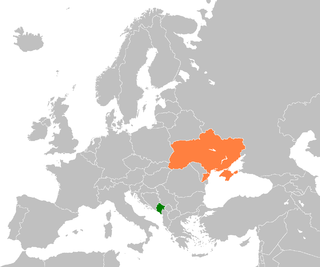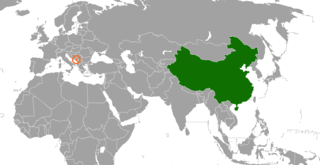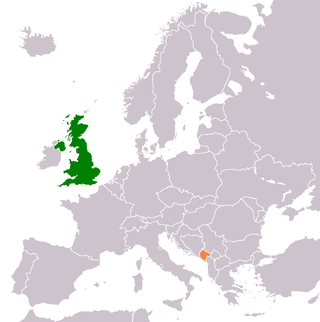
Montenegro is a country in Southeastern Europe, on the Balkan Peninsula. Its 25 municipalities have a total population of 633,158 people in an area of 13,883 km2. It is bordered by Bosnia and Herzegovina to the northwest, Serbia to the northeast, Kosovo to the east, Albania to the southeast, Croatia to the west, and has a coastline along the Adriatic Sea to the southwest. The capital and largest city is Podgorica, while Cetinje is the Old Royal Capital and cultural centre.

In a referendum on 21 May 2006, the people of Montenegro opted to leave the State Union of Serbia and Montenegro. This result was confirmed with a declaration of independence by the Montenegrin parliament on 3 June 2006. It simultaneously requested international recognition and outlined foreign policy goals.

Operation Libelle was an evacuation operation of the German Armed Forces that took place on March 14, 1997 in the Albanian capital of Tirana during the Albanian unrest of 1997. In the same week, American, British, and Italian military forces evacuated their citizens from Albania. Operation Libelle was the first time since World War II that German infantry fired shots in combat.

According to the 2012 U.S. Global Leadership Report, 26% of Montenegrins approve of U.S. leadership, with 48% disapproving and 26% uncertain.

Greek-Montenegrin relations are foreign relations between Greece and Montenegro. Relations between the Principality of Montenegro and the Kingdom of Greece officially started in 1881. The countries' relations were excellent especially during the Balkan Wars and World War I. Greece recognized Montenegro on 13 June 2006. Both countries established diplomatic relations on 18 December 2006. Montenegro has an embassy in Athens. Greece has an embassy in Podgorica. Both countries are full members of the Council of Europe, and of the NATO. Also Greece is an EU member and Montenegro is an EU candidate. Greece supports the Accession of Montenegro to the European Union.

Foreign relations between Croatia and Montenegro are bound together by shared history, intellectual development, and common geography. Both states are members of the Council of Europe and NATO. Montenegro has been a candidate to join the European Union since 2012, a pursuit supported by Croatia, who has been an EU member since 2013. Their diplomatic relations have been friendly and amicable, with strong political and economic collaboration. Small border disputes have remained unresolved between the two states since the dissolution of Yugoslavia, as do some shipping and naval disagreements.

Montenegro–Ukraine relations relate to bilateral relations between Montenegro and Ukraine. Formal relations began on 15 June 2006 when Ukraine recognized Montenegro, less than two weeks after the Parliament of Montenegro declared the independence of Montenegro from Serbia. Both countries established diplomatic relations on 22 August 2006. Montenegro has an embassy in Kyiv. Ukraine has an embassy in Podgorica. Although economic ties are weak, Montenegro is a transit point for human trafficking between Ukraine and the rest of Europe. Montenegro is a member of NATO, which Ukraine applied for in 2022. Ukraine is a member of the BSCE, with Montenegro being a sectoral dialogue partner.

Bulgarian-Montenegrin relations are foreign relations between Bulgaria and Montenegro. Relations between the two were originally established in 1896, while Montenegro had been a kingdom and Bulgaria had exercised special self-governing status while nominally part of the Ottoman Empire. Bulgaria recognized Montenegro on June 12, 2006. The modern countries established diplomatic relations on August 2, 2006. Both countries are full members of the Council of Europe, and of NATO. Bulgaria is an EU member and Montenegro is an EU candidate.

China–Montenegro relations are foreign relations between the People's Republic of China and Montenegro. People's Republic of China has officially recognized Montenegro on June 14, 2006. Diplomatic relations between the two countries were established on July 7, 2006. China transformed its consulate into an embassy in Podgorica on July 7, 2006. The Montenegrin embassy in China opened in Beijing on November 13, 2007.

Montenegrin–Slovenian relations are foreign relations between the Montenegro and Slovenia. Until 1991, both countries were part of Yugoslavia. Slovenia recognized Montenegro's independence on June 20, 2006. Both countries established diplomatic relations on June 21, 2006. Montenegro has an embassy in Ljubljana. On June 23, 2006, Slovenia opened its embassy in Podgorica.

Foreign relations exist between Austria and Montenegro. Austria recognized Montenegro on 12 June 2006. Both countries established diplomatic relations with each other on the same day. Austria has an embassy in Podgorica and an honorary consulate in Budva. Montenegro has an embassy in Vienna. Austria is an EU member and Montenegro is an EU candidate. Austria supports Montenegro's European Union membership.

Portuguese-Serbian relations date back to 1882. Portugal has an embassy in Belgrade, and Serbia has an embassy in Lisbon. Despite support by Portugal for the independence of Kosovo, Serbian Prime Minister Mirko Cvetković was keen to improve bilateral cooperation. Also, Portugal is backing Serbia's accession to the European Union (EU).

Montenegrin–Serbian relations are foreign relations between Montenegro and Serbia. From 1918 until 2006, the two states were united under the Kingdom of Yugoslavia, the Socialist Federal Republic of Yugoslavia, and Serbia and Montenegro. Since 2006, there have been sporadic instances of debate on Montenegro's legitimacy as a separate state as well as much more prominent controversial debate on the Montenegrin ethnic identity. Despite this, the two countries have maintained mostly friendly geopolitical and economic relations.

Both Montenegro and the Republic of North Macedonia are full members of the Council of Europe and of the NATO. The Foreign Ministry of North Macedonia states the two countries have excellent political ties, without any open issues between the two countries. The embassy of North Macedonia to Montenegro is located in the capital city of Podgorica. Montenegro's embassy in North Macedonia is also located in the country's capital city, which is Skopje. Also, Montenegro has an honorary consulate in the city of Bitola.

Montenegro–United Kingdom relations are the bilateral relations between Montenegro and the United Kingdom. Both nations are members of the Council of Europe and NATO and had fought on the same side in both World War I and World War II.

Montenegro–Turkey relations are the bilateral relations between Montenegro and Turkey. Turkey officially recognized Montenegro on June 12, 2006. Diplomatic relations between the two countries were established on July 3, 2006. Both countries are full members of the Union for the Mediterranean, Council of Europe and NATO. And Montenegro is with Slovenia is Sectoral dialogue partner countries of Organization of the Black Sea Economic Cooperation.

Albania–Slovenia relations are diplomatic relations between the Republic of Albania and the Republic of Slovenia. Albania has an embassy in Ljubljana and Slovenia has an embassy in Tirana. Both countries established diplomatic relations on 9 March 1992.

Montenegro–Spain relations are the bilateral and diplomatic relations between these two countries. Both countries are full members of the Council of Europe, and of the NATO. Montenegro has an embassy in Madrid. Spain is accredited to Montenegro from its embassy in Belgrade, Serbia. Montenegro is a European Union candidate and Spain is a European Union member state.

Bosnia and Herzegovina–Montenegro relations are foreign relations between Bosnia and Herzegovina and Montenegro, two neighboring Western Balkans countries. Following the 2006 Montenegrin independence referendum Bosnia and Herzegovina recognized Montenegrin independence on 21 June 2006 and the two countries established formal diplomatic relations on 14 September 2006. Embassy of Bosnia and Herzegovina in Montenegro was opened on 10 December 2007. Both countries are aspiring members of the European Union with Montenegro being a candidate country since 17 December 2010 while Bosnia and Herzegovina has been a candidate country since 15 December 2022. The two countries support each other in this ambition.

Albania–Montenegro relations are the bilateral relations between Albania and Montenegro established in 2006. Albania has an embassy in Podgorica. Montenegro has an embassy in Tirana. Both countries are full members of the Council of Europe, the Organization for Security and Co-operation in Europe (OSCE), the Central European Free Trade Agreement (CEFTA), and NATO.























